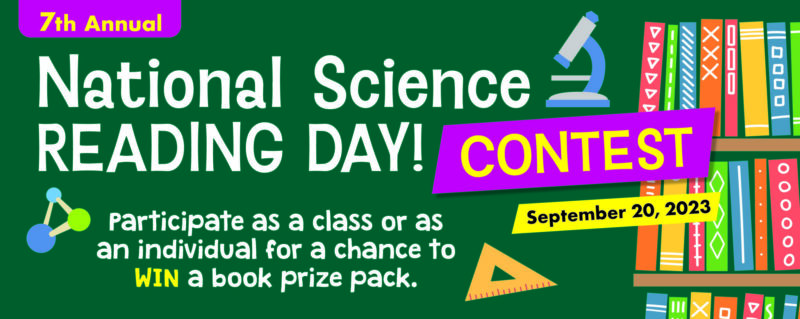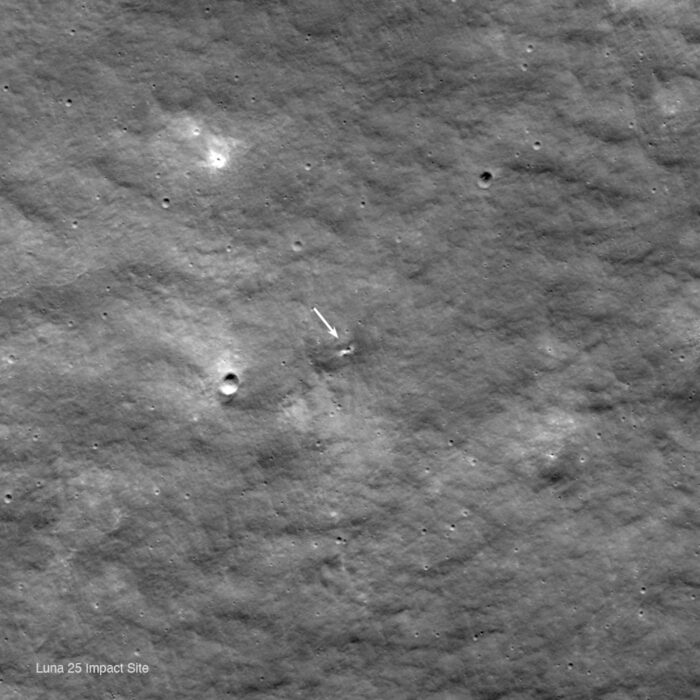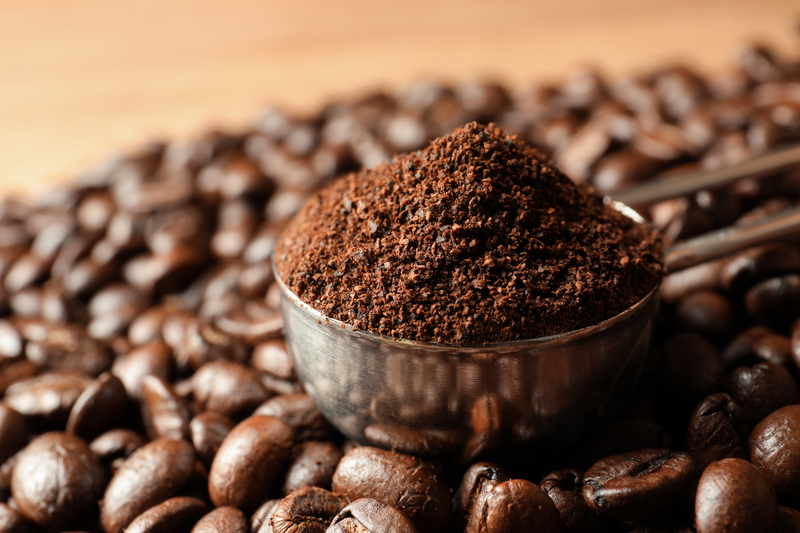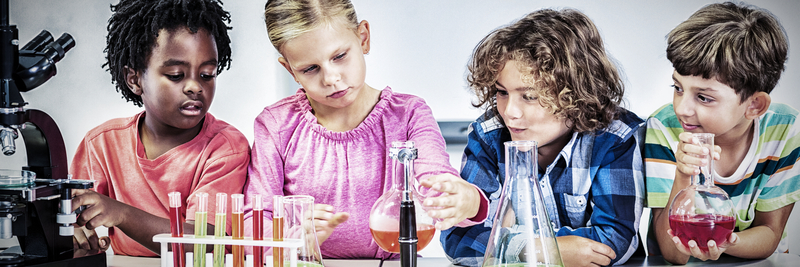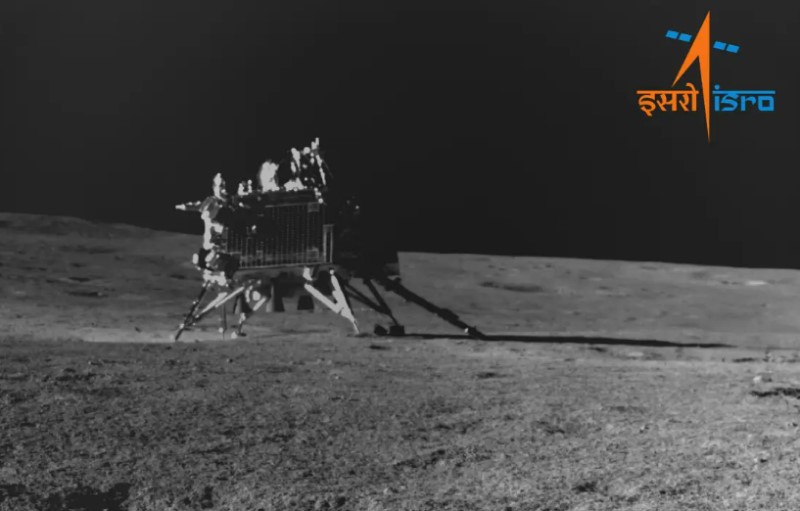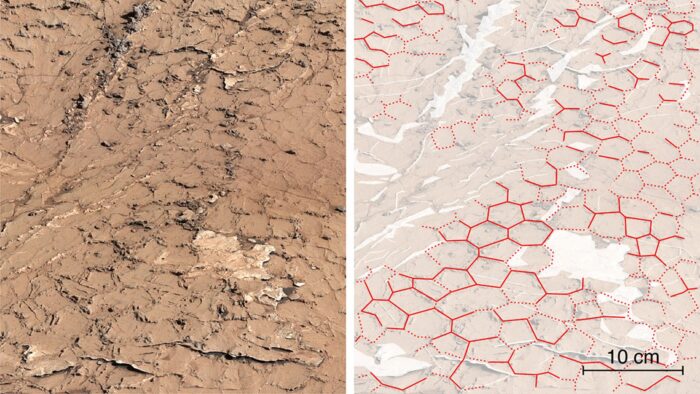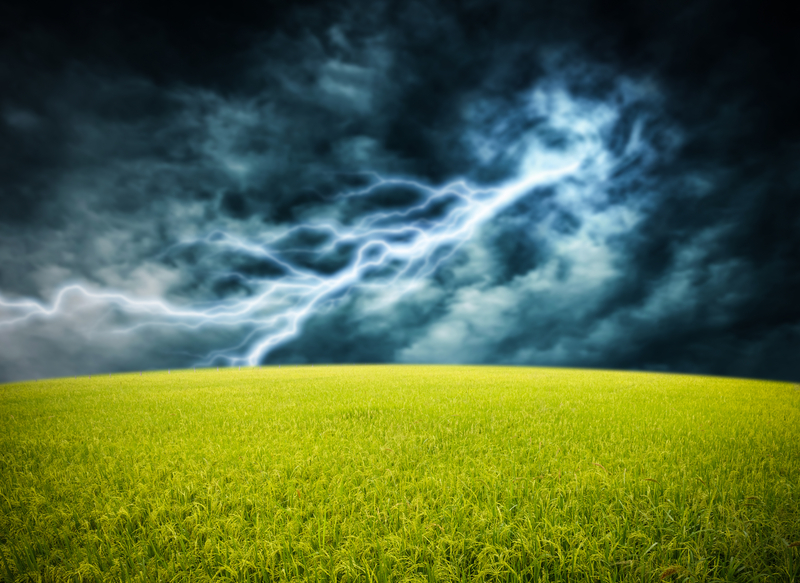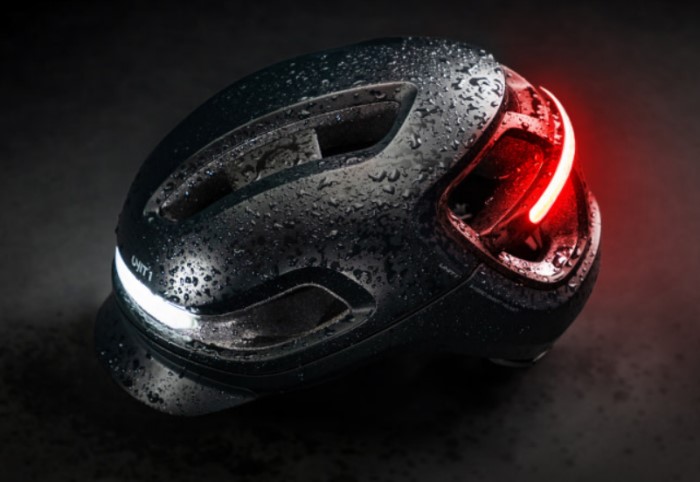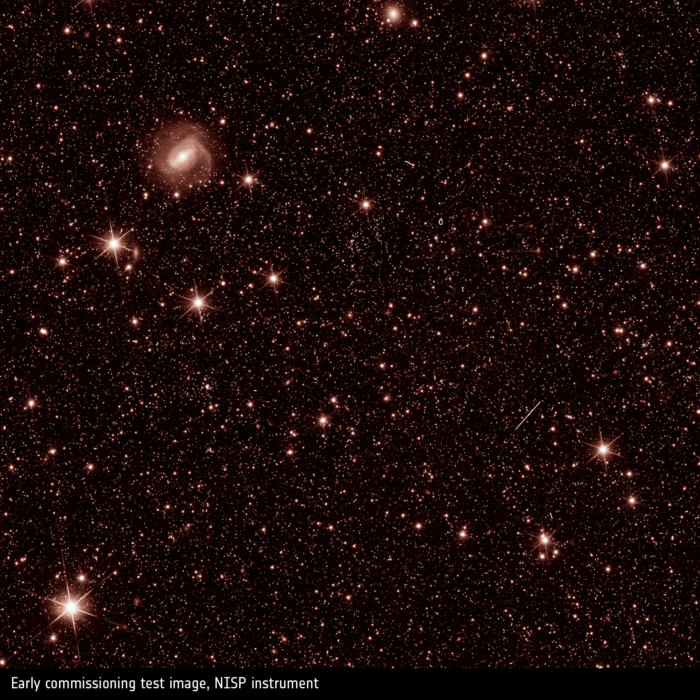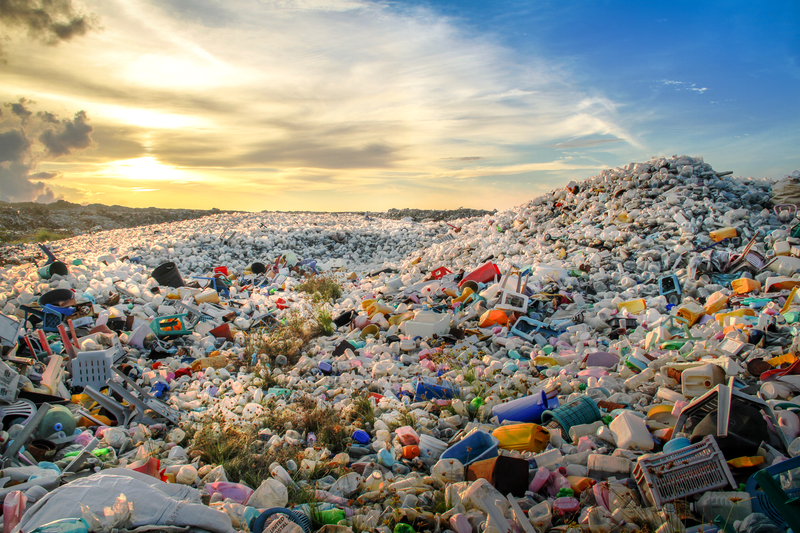May 7 to 22 is Science Odyssey, a celebration of all things science! OWLconnected is recognizing this two-week event with lots of science content, as well as with an amazing contest, presented by our friends at the Natural Sciences and Engineering Research Council of Canada (NSERC). Details are at the end of this post—be sure to enter!
The many talents of Ann
"I would love to rebrand the term 'Renaissance woman' in the 2020s," exclaims Ann Makosinski early in our interview. And maybe she already has.
A Renaissance person is someone who has many talents and areas of expertise. Which sounds a lot like Ann!
So far, this 24-year-old from BC has studied English and acting; delivered public speeches across the globe; appeared on Jimmy Fallon (twice); worked on podcasts; traveled to the Arctic Circle; won recognition from Forbes, TIME, and Popular Science magazines; and been a spokesperson for Maybelline and Uniqlo. (That's just scratching the surface...) And you'll never guess where it all began.
At science fairs!
How science opened up Ann's world
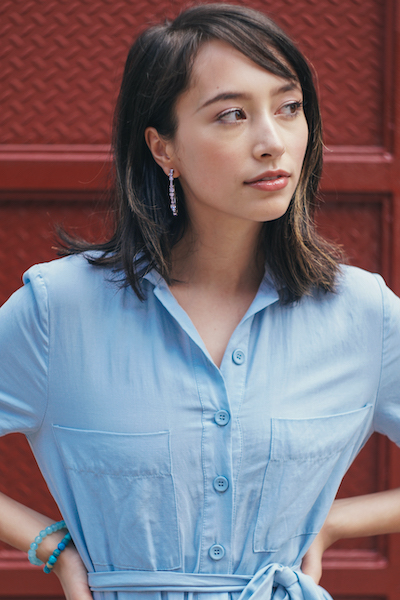
(Courtesy of Ann Makosinski/annmakosinski.com)
Ann is a driven inventor who has made a coffee mug that can charge a phone, a flashlight that is charged by the heat of your hand, and even toys that run on green energy.
But how did a young Filipina-Polish Canadian go from a Grade 6 project on laundry detergents to explaining science to Miley Cyrus on YouTube? That's what we wanted to figure out as we spoke with her during our celebration of Science Odyssey.
OWLconnected: What did you think of science as a kid?
Ann Makosinski: I didn't necessarily think I was interested in it. It was more that all my interests and passions and curiosities were answered by science.
I loved bugs and insects. I would collect them from our compost pile and keep them in little containers, and water and feed them every morning before school. I was interested in bones and dead birds that I would find on the side of the road. What's inside them? How do they function?
OC: So living things and how they worked?
AM: I had a variety of interests in nature and science, and getting my hands dirty. I also loved taking apart old computers and printers and hard drives … Whatever I could get my hands on! I just wanted to see what was inside, how things worked.
OC: So all things and how they worked!
AM: It was just so fascinating for me. When you are young, you are still discovering the world and you're curious. Then electronics and making things and inventing just kind of came naturally to me.
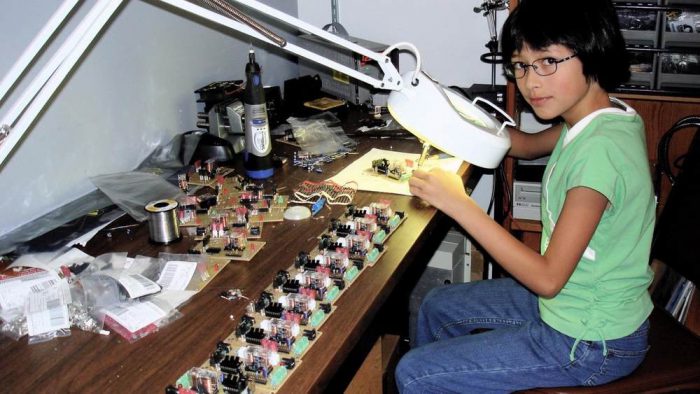
Young Ann works on one of her earliest science fair projects in her childhood workshop. (Arthur Makosinski)
OC: So inventing was right in your wheelhouse.
AM: I think my interest in science was also encouraged by my lack of entertainment—or my lack of traditional entertainment. I wasn't really allowed to watch a lot of television shows. Computer games were not really a thing for me when I was growing up.
I wasn't allowed a Tamagotchi [a robot pet most popular in the late 90s and 2000s], which was the cool thing to have when I was a kid. My dad told me it would fry my brain cells. So I went to my classmates and told them that their brain cells were going to be fried. They loved me for that! (laughs)
So I had to be working with my hands and inventing things to entertain myself.
OC: And then it slowly grew to something more?
AM: I sort of fell into inventing little trinkets for my science fair projects when I was in the sixth grade. I don't remember the first time someone called me an inventor or a little scientist. I didn't really define myself like that. If anything, science fair and inventing was something I considered a hobby. I didn't necessarily think I could turn it into a career.
And I had also had these other interests in the arts at the same time and I wanted to do both. Even now as an adult, I'm still a little confused about what I would call myself.
OC: We literally did want to ask what you would call yourself, because you do many different things. Do you think of yourself as a scientist, as an inventor, or you do you feel like you are still putting the pieces together?
AM: That's a good question. If you'd asked me when I was 10 or 11, I would've said a film director and an archeologist. I would still be so down to be an archeologist or a film director. Or an entomologist who studies insects!
When I was 17, 18, I was really into the young entrepreneur (business) world because I had so many young entrepreneur friends and I thought that's what I wanted to do. At that time, I would've called myself an entrepreneur/inventor.
And then if you'd asked me at 21, I would've said, I'm a public speaker and inventor, but I'm also studying acting.
And now at 24, I would say, I like to create things! Whether it is a physical invention or a storyline for a script. I have a lot of different passions, which is why I think ‘Renaissance woman’ makes the most sense for me. I've found that when my skills in both the arts and sciences come together, that is when I've come up with the most creative ideas.
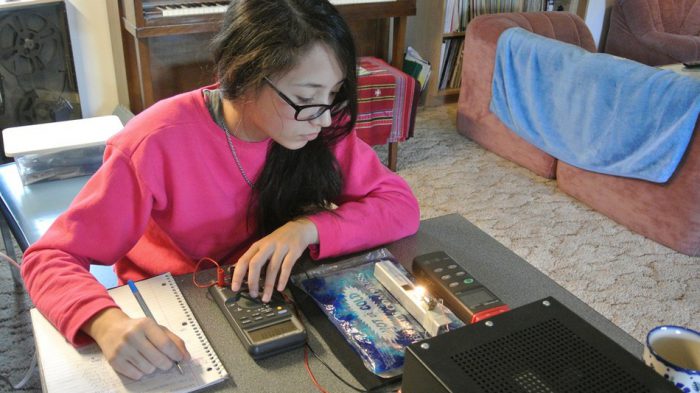
Creative and creating! Teenage Ann putting another project through the tests. (Arthur Makosinski)
OC: When you're young, you often get asked, What do you want to do with your life? It is a difficult question to answer.
AM: In high school, I suddenly gotten all this attention for my inventions. So people began assuming that I would do engineering and be this young inventor genius child. And my parents also had always wanted me to do engineering—it was so exciting for them.
But I think having all that attention as a young person made me feel a lot of pressure that I didn't know how to handle. Do I want to do engineering and science because it's something that I really want to do, or because I feel like that's what everyone is expecting me to do?
And that's really hard to figure out when you are 16, 17. It's a big question.
OC: Is there anything that you’ve done that has really surprised you?
AM: The times where I've really pushed myself outside of my comfort zone and not known what I was getting into are the times I've grown the most. I was so lucky to join the Canada C3 expedition a few years ago and I sailed through the Northwest passage and all around the Arctic for two weeks.
OC: Whoa!
AM: At one point we stopped this huge icebreaker ship to jump into the middle of the Arctic Ocean. I don't know how tall it was—I'd never done anything like that before. I was so scared! But then we jumped, and when I reemerged, I just had this feeling of being reborn in some sense. I had just done something so scary, but so exhilarating at the same time.
Ann during a campaign with Japanese clothing company Uniqlo (she explains her incredible flashlight in the video, too!).
OC: You’re very eco-conscious, and you’ve had a chance to work with lots of different brands, including big ones that usually aren’t tied to science or green awareness. What’s that like? Is it a necessary evil, or an exciting opportunity to expose people to issues you care about?
AM: That's a great question—I’ve never been asked that. My manager and I try to be very careful of what I engage with through social media, especially when it comes to brands. 'Necessary evil' can be a great way to put it—I have to pay the bills.
But if a brand wants to work with me, I'm always really honoured that they even think of me. Because typically the ‘science girl’ is not the type of person a brand wants. It's more that they want an activist, artist, poet, singer, athlete. It's never really been the 'science girl' in mainstream brands or designer brands.
OC: Yeah, that’s true.
AM: I worked with Maybelline recently—and Uniqlo in the past—and anytime a brand has wanted to do something with me, it's very exciting! I think the idea of being a female who has a passion in the sciences and also loves fashion or makeup has just not been accepted.
When I was 15, 16, my parents would be like, “Don't wear too much makeup. Dress conservatively. People need to take you seriously.” Then just a few years ago, I did a video with Google Pixel, and I was so excited because the director put me in this really cool set that was like 1960s-themed and she did my hair 60s style, which I loved! But so many people in the (YouTube) comments were like, “Why did they do her hair? Now we won't take her seriously.”
OC: That’s too bad.
AM: It's just mind blowing that we're still experiencing things like that. There needs to be more exposure like that of young women who are makers, scientists, or inventors. We need scientists to be just as celebrated and cool as singers.
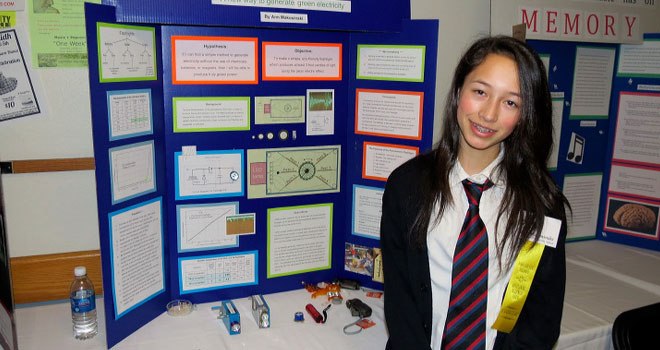
Ann attending one of her many science fairs. These events taught her so much! (Arthur Makosinski)
OC: Can you talk about what science fairs brought to your life?
AM: In Grade 4, I had moved to a school where none of the students were told to do science fair. But all of my old classmates at my old school all had to do science fair as part of the curriculum. So because I missed my classmates, my parents would take me to go look at their science fair projects. And I thought, “Maybe, this could be something I could do...”
So in Grade 6, I joined the science fair. I was the only kid in my grade, if not in my school! And my first project, I was just taking something I had done in class about comparing laundry detergents, and then fancying it up a bit. (laughs)
But what I didn't realize until after I ended up doing TEN science fairs, was that I learned so many skills in both the sciences and the arts from my fair projects.
The science part is where you have a question, you make an objective, you do background research, you start experimenting, building the prototype, seeing what works, all of that. But there’s so much more.
You have to a write a report, and write well and accurately. You have to make a poster that is visually appealing. You also have to be able to present your project to a professor who is an expert in that field.
OC: That’s a lot!
AM: You're learning all these different skills that you wouldn't typically think. I truly credit science fairs for giving me so many skills. It was a great time!
Contest alert
Don't forget to enter the Science Odyssey Contest! CLICK HERE TO ENTER.

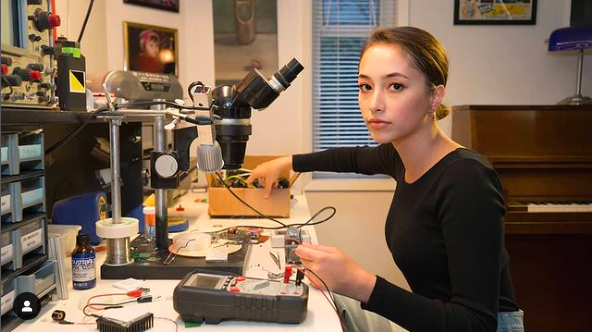 Hard at work on inventions. It's just one of the many things that Ann gets up to these days. (Instagram/@annmakosinski)
Hard at work on inventions. It's just one of the many things that Ann gets up to these days. (Instagram/@annmakosinski)
